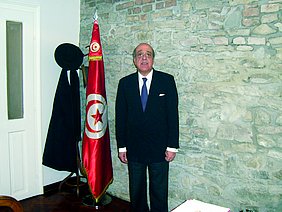Tunisia today has changed for the better while its people remain tolerant, moderate, open minded, warm and traditionally generous.
Now, Tunisia has started its difficult journey toward democracy.
Security has been restored and efforts are being deployed in order to reassure our partners, keep a balance between management of social expectations, on the one hand, and the macro-economic and budget stability, on the other, not to mention the steps to solve unemployment, re-energize the economy, narrow regional disparities and reduce poverty. The political challenge we are now facing is that the democratic transition has to succeed. The economic challenge is to avoid the vicious circle of poverty and rising unemployment which would fuel discontent and disappointments. Tunisia can and will rely on its own forces. Effective support from the international community is instrumental in order to bring the process to a successful end.
The road looks long and the process sometimes painful, but the move is irreversible. Since January, there have been advances in areas related to freedom of expression and freedom of association, accountability and political reform, including the establishment of an Independent Higher Authority for elections which organized, supervised and monitored the entire electoral process of the election of the Constituent Assembly held the 23rd October.
Austria is a great and important friendly country and the bilateral cooperation are excellent at all levels.
We also expect the realization of the official visit of H.E. the President Dr. Heinz Fischer and the Minister for Foreign Affairs, H.E. Dr. Michael Spindelegger during this year. This visit will certainly boost the friendly bilateral cooperation.
It was an important positive political message from Austria when his Excellency the foreign minister made a statement on the 29th of January supporting the revolution in Tunisia. On 14 January 2011, with astonishing speed, while the whole world was watching, sometime with amazement, Civil society and especially women and youth which played a key role in the protest movement, embarked on a historic move to create a more free and prosperous society, ensure inclusive participation in public affairs, accountability, equity and social justice as well as the redefinition of the relationship between the state and its people, based on the rule of law and the protection and promotion of human rights.Tunisia now stands at the crossroads with great assets and large opportunities but also facing numerous challenges. Tunisia has indeed several assets to make this transition a success: a high literacy rate, a developed middle class, a very advanced status for women and a high level of education and hard workers.There is indeed a strong political will to strengthen further and extend the scope of cooperation between Austria and Tunisia. There is much we can learn from Austria in particular with regard to equitable region development and decentralization. Austria has advanced expertise inter alia in water sanitation infrastructure, renewable energy. Numerous Austrian enterprises are already doing business in Tunisia and there are certainly more opportunities for win-win-partnerships.

